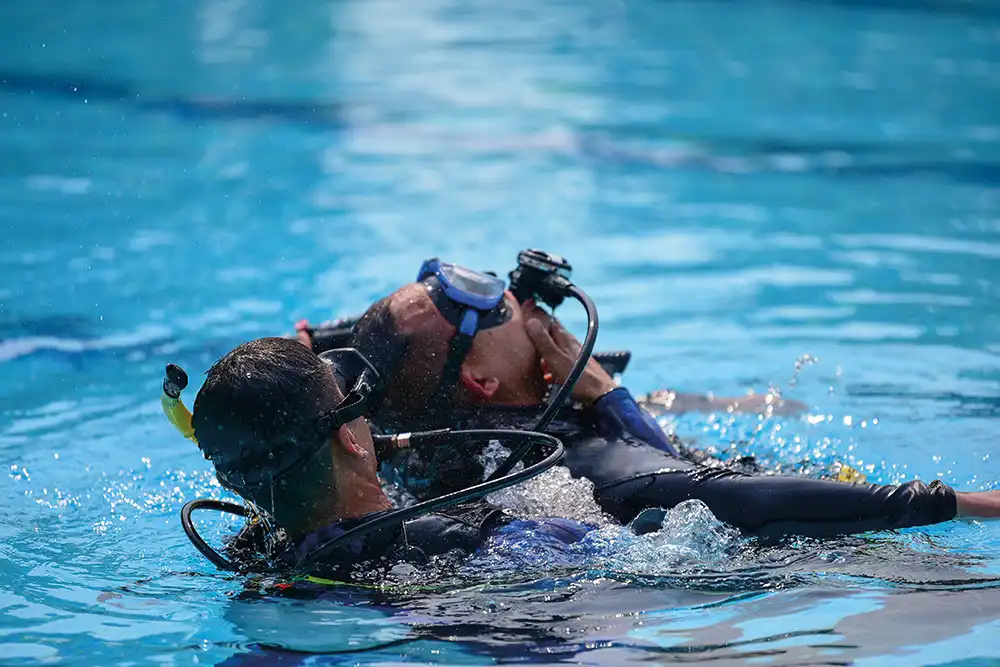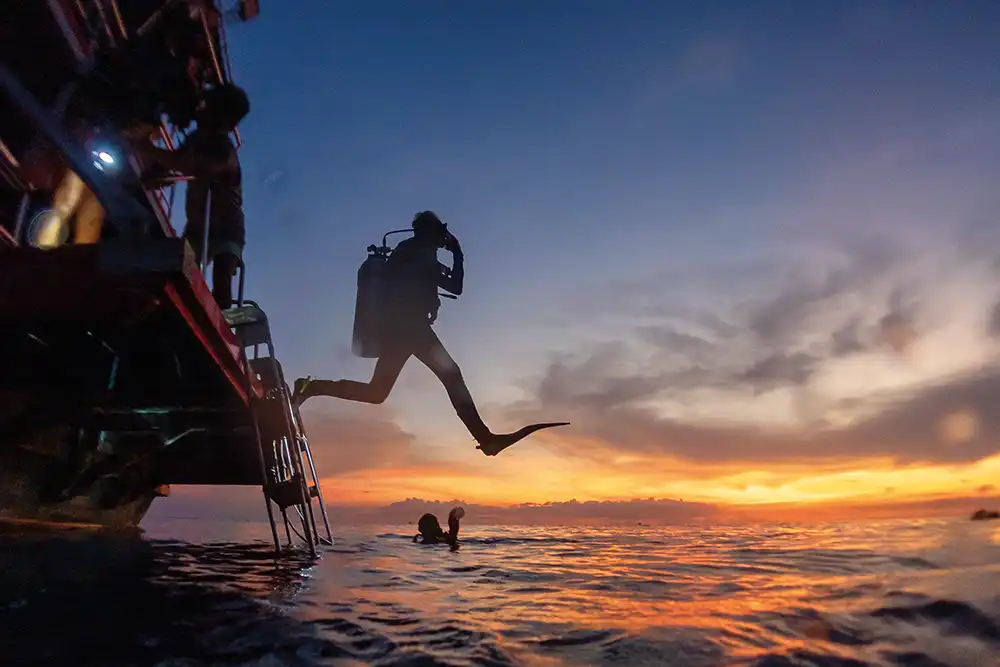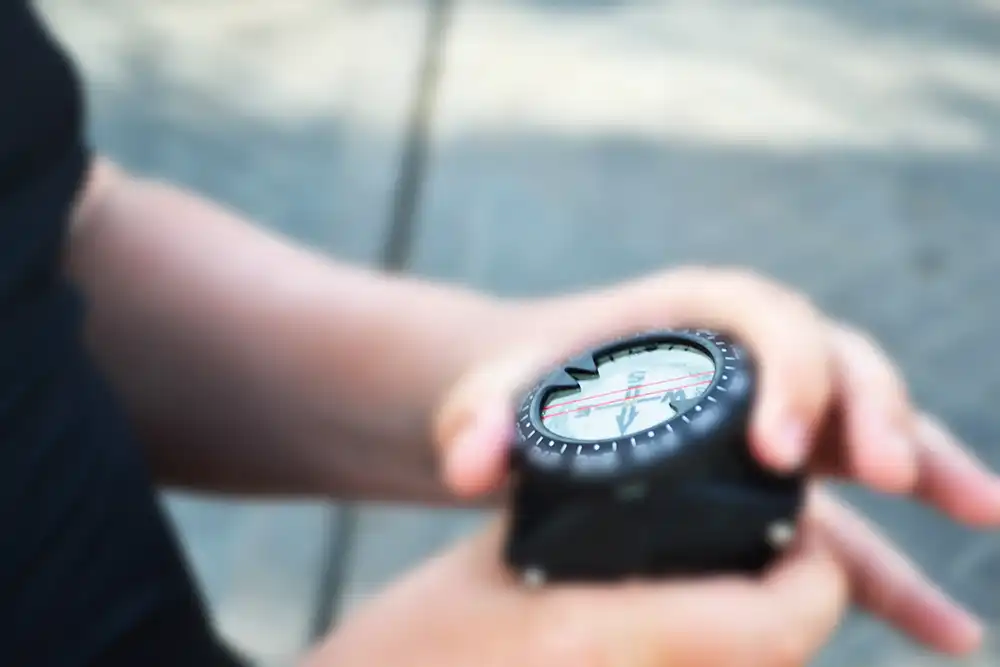
Former instructor Mark ‘Crowley’ Russell on why continuing education programmes are essential for both divers and dive businesses.
I’ve been asked many times what is the best thing you can do to become a better diver – to which I reply: ‘Never stop learning.’
I think it applies to almost everything in life, but scuba diving, in which we must learn to exist in an environment completely alien to our own, is an activity where it is especially relevant.
While the laws of physics remain immutable, we are affected by them differently underwater. We become lighter and then heavier with every breath we take, we are unable to move as quickly as we can at the surface, and we cannot fight even the most gentle movement of water in the same way our feeble bodies cannot withstand hurricane force winds.
Regardless of which club or agency a diver chooses to start their newfound pastime with, the entry-level course will only ever confer on them the basics of dealing with that new approach to everyday physics.
Most divers will go on to complete an Advanced Open Water equivalent (or Open Water Plus, as I think it should be called), the entry-level adjunct which permits divers to descend to 30m. However, once that permission has been granted, many call an end to their scuba-diving education.

Most divers will be aware of the many continuing education programmes available. There is a wide range of speciality courses covering everything from boat diving and drift diving, to nitrox diving, night diving, search and recovery and underwater photography, plus a host of marine science and conservation-type programmes.
With the exception of an enriched-air certification to use recreational nitrox, most dive operators do not require that recreational divers take extra courses to undertake certain activities.
Beyond needing an AOW equivalent to take part in 30m dives, I know of no dive centre in my own experience that requires divers to have a drift-diving certification to go drift diving, or a night-diving certification to dive in the dark.
Some of the speciality programmes, therefore, come in for a bit of stick. Certain divers scorn what they consider to be fairly basic courses such as boat diving or drift diving, and yet most of these programmes, however simple they may appear, contain a lot of valuable information from which even experienced divers may learn.

Consider that many divers in land-locked areas will have little or no experience with boats, and PADI’s often-mocked ‘Boat Diver Specialty’ teaches much more than just how to fall off a RIB and get back onto it.
Drift diving – while exhilarating – can be terrifying for the inexperienced diver, so to have some managed practice under the guidance of a dive professional is an important step on many divers’ educational ladder.
Others – such as PADI’s Search & Recovery Specialty – go well beyond the scope of the average diver; ‘Underwater Naturalist’ borders on university-level marine biology; and underwater photography classes will transform the results of camera-wielding amateurs.
Basic dive skills are inevitably improved as a consequence of exposure to new information and learning new underwater techniques.

Yes, continuing education is a money-spinner for dive centres. Margins in the scuba-diving industry world can be vanishingly small, but continuing education courses tend to be a little more lucrative than entry-level programmes.
Dive professionals are therefore encouraged to up-sell such courses – it generates income and helps to create trust and loyalty between businesses, brands and customers.
Am I promoting the sale of such courses? I absolutely am. Not specifically for any particular brand (I tend to default to PADI as I am a former PADI instructor), but for the benefit of everyone involved – on both sides of the payment window.
A better understanding of the underwater world enhances both dive enjoyment and diver safety, but progress requires training, and training requires that viable businesses exist to provide it.
Do I need a ‘Master’ Scuba Diver certification?
Once a diver has completed some extra speciality programmes, added a stress and rescue diver course with emergency first-aid training, and logged 50 dives, some agencies – PADI, SSI and SDI among them – will reward divers with a ‘Master Scuba Diver’ or ‘Master Diver’ certification, confirmation that they have joined the scuba diving ‘elite’.
Such certifications are widely criticised as an unnecessary gimmick (probably because PADI charges divers £30-odd for the privilege of being issued a new card), and there are, sadly, many divers who sneer at the concept of a scuba diver with 50 dives somehow being at the pinnacle of their recreational diving careers.
There is, therein, a valid point – 50 dives does not an expert diver make, but, equally, it represents a significant investment of time and money into a scuba-diving education – perhaps five years or more for somebody who only gets to take a single-week dive holiday each year – and a commitment to scuba diving that is as strong as those who can afford to dive more regularly.

Such a person is somebody I would warmly welcome into a dive centre in the days when I was working as a full-time dive professional. Not because I thought they might spend more money on courses (one can always hope!), but because they are clearly somebody who is interested in learning more about the activity they have chosen to pursue.
They, therefore, enjoy diving more, are more enjoyable to dive with, and are – very importantly – safer divers.
Not all clubs and agencies offer an MSD equivalent, but some form of recognition after passing educational milestones is a worthy goal. I personally do not think there should be any charge for the extra certification (especially since the arrival of digital certification cards), but I think the level of achievement is something to be encouraged and should be, in my opinion, a bare minimum prerequisite for professional level training.
Continuing education is the lifeblood of the recreational scuba industry – and a pathway to the world of technical diving or careers in underwater photography, marine biology, or even search and rescue diving, for those prepared to take the first step.
People will undoubtedly continue to turn up their noses at the ‘Master Scuba Diver’ concept but, in all honesty, I’d rather dive with someone who waved that level of certification at me than somebody who didn’t think it necessary to continue their underwater education beyond 30 metres
More great reads from our Magazine
- The Young Dive Ambassadors of Atlantis Dumaguete
- Ocean Life – Alan J Powderham’s Coral Triangle Cameos
- Inspiring Hope – an interview with Cristina ‘Mitty’ Mittermeier
- Ross Merrin on training as a BDMLR Marine Mammal Medic
- Shark and Jolanda Reef – Howard Rosenstein on the day it all began…

- Crown-of-thorns outbreak developing in northern Great Barrier Reef - 29 January 2026
- Six bodies recovered in search for missing Philippines divers - 27 January 2026
- DIVE’s Big Shot Light and Shadow – win an Aggressor Adventures liveaboard trip - 23 January 2026



